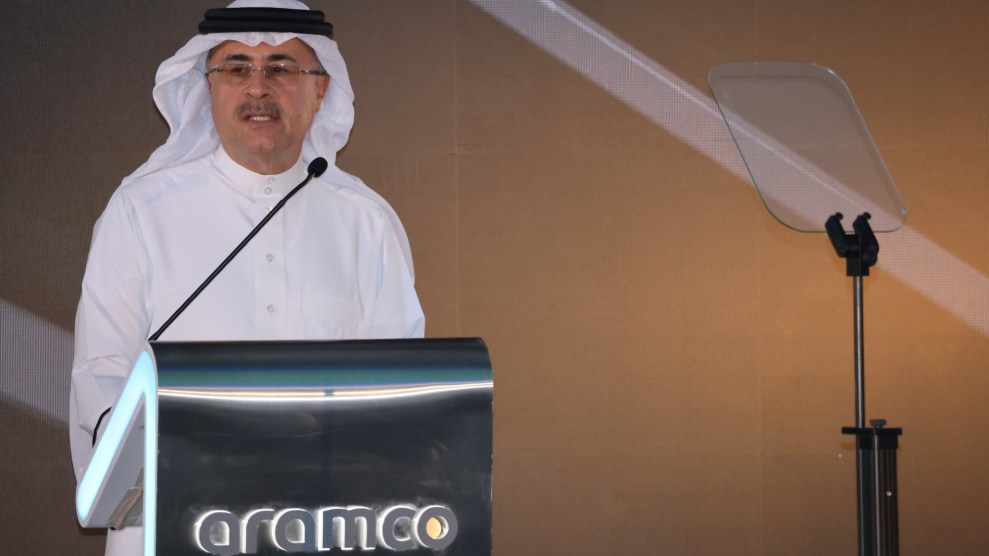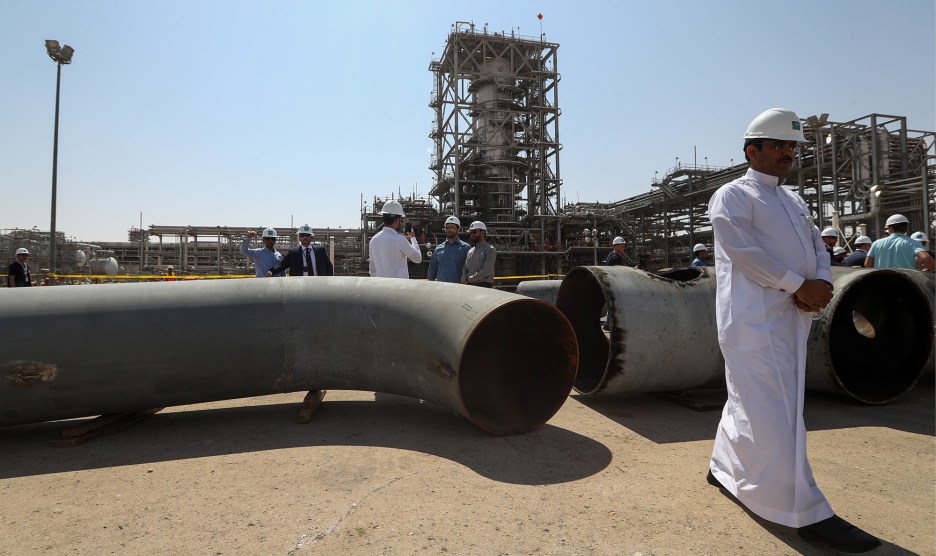
Amin H. Nasser, the Aramco president and CEO, speaks during a signing ceremony in Dammam, Saudi Arabia.Wang Haizhou/ZUMA
This story was originally published by the Guardian and is reproduced here as part of the Climate Desk collaboration.
Saudi Arabia is driving a huge global investment plan to create demand for its oil and gas in developing countries, an undercover investigation has revealed. Critics said the plan was designed to get countries “hooked on its harmful products.”
Little was known about the oil demand sustainability program (ODSP) but the investigation obtained detailed information on plans to drive up the use of fossil fuel-powered cars, buses, and planes in Africa and elsewhere, as rich countries increasingly switch to clean energy.
The ODSP plans to accelerate the development of supersonic air travel, which it notes uses three times more jet fuel than conventional planes, and partner with a carmaker to mass produce a cheap combustion engine vehicle. Further plans promote power ships, which use polluting heavy fuel oil or gas to provide electricity to coastal communities.
The ODSP is overseen by Saudi Arabia’s de facto ruler, the crown prince Mohammed bin Salman, and involves its biggest organizations, such as the $700 billion Public Investment Fund; the world’s largest oil company, Aramco; the petrochemicals firm Sabic; and the government’s most important ministries.
In publicly available information, the program is largely presented as “removing barriers” to energy and transport in poorer countries and “increasing sustainability,” for example by providing gas cooking stoves to replace wood burning.
However, all the planned projects revealed in the investigation by the Centre for Climate Reporting and Channel 4 News involve increasing the use of oil and gas. An official said this was “one of the main objectives.”
The head of the World Bank said recently that rich countries and companies needed to help developing countries leapfrog over the fossil-fueled economic growth of the past and roll out renewable energy. If they did not, Ajay Banga said, there was no hope of ending carbon emissions by 2050, as the world’s scientists had repeatedly made clear was necessary to avoid climate catastrophe.
Saudi Arabia has said it is committed to the Paris agreement’s climate goals to restrict global heating to well below 2C while aiming for a 1.5C rise at most. To achieve this, fossil fuel emissions must fall rapidly and most oil and gas reserves must be kept in the ground, meaning climate policies, such as support for electric cars, pose a significant threat to the oil-rich state’s revenues.
A significant issue at the UN’s Cop28 climate summit, which will begin on Thursday, is whether countries can deliver a pledge to phase down—or phase out—fossil fuels. This year the climate crisis has smashed temperature records, and supercharged extreme weather has taken lives and livelihoods around the world.
Mohamed Adow, the director of the thinktank Power Shift Africa, said: “The Saudi government is like a drug dealer trying to get Africa hooked on its harmful product…
“The rest of the world is weaning itself off dirty and polluting fossil fuels and Saudi Arabia is getting desperate for more customers and is turning its sights on Africa. It’s repulsive,” he said. “Africa cannot catch up with the rest of the world by trudging along in the footsteps of the polluting nations. It would mean we miss out on the benefits of modern energy solutions that Africa can take advantage of due to its massive renewable energy potential. We have the latecomer advantage, which means we can leapfrog to a genuine energy transition.”
António Guterres, the UN secretary general, said in 2021: “We need to see adequate international support so African and other developing countries’ economies can leapfrog polluting development and transition to a clean, sustainable energy pathway.”
The Saudi Arabian ministry of energy did not respond to a request for comment.
The brief information on the program’s English-language website calls it the oil sustainability program, while on the Arabic version it is described as the oil demand sustainability program.
Its stated objective, according to the Arabic site, is to “sustain and develop the demand for hydrocarbons as a competitive source of energy, by raising its economic and environmental efficiency, while ensuring that the transition in the energy mix [is] sustainable for the kingdom of Saudi Arabia.”
An announcement in June to the Saudi stock exchange about a memorandum of understanding signed by ODSP and the Saudi Industrial Export Company initially said it would enable “activities in the fields of sustaining the demand of oil.” A correction the following day replaced this phrase with enabling “activities to increase energy access.”
Details of the ODSP’s projects were exposed after undercover reporters posed as potential investors and met officials from the Saudi government. This revealed that increasing demand for oil and gas in developing countries was a thread running through the planned projects.
The presentation used by the officials said the strategy was to “unlock demand in emerging markets by removing barriers to energy access through infrastructure investments.” When asked by the reporters whether the aim was to artificially stimulate demand in some key markets, an official said: “Yes, it’s one of the main objectives that we are trying to accomplish.
“We don’t believe it’s possible that [developing countries] can skip this [fossil fuel] phase because, in order to implement electric vehicles fully, you’ll need a ready infrastructure,” the official said. “A lot of African countries now do not have enough grid [electricity] to support their day-to-day lives. We believe they deserve the chance to get the required energy for their development now. Then in the future they can work to improve or to transit into more efficient energy sources.”
One of the criteria for the selection of the ODSP’s 46 projects was the “incremental demand potential,” the officials said, with the program facilitating the finance required for the projects.
The projects are in three categories: transport, utilities, and materials, with the third promoting the replacement of some cement, steel, and wood used in construction with oil-derived plastics.
“The objective of the transportation sector is to enhance the long-term sustainability of transportation fuel. We’re talking about diesel, gasoline, and jet fuel,” an official said, with financing roads part of the plan.
“We aim to accelerate and enhance the impact and adoption of internal combustion engine [ICE] technology and optimization,” the official said. “We have also an opportunity for increasing availability and adoption of low-cost cars, especially in emerging markets. Only 3 percent of people are owning cars in Africa.”
According to the presentation, the plan is to “partner with a car [manufacturer] in…the development and production of a highly competitive low-cost car” that will “have an oil uplift for the kingdom.”
The ODSP is additionally targeting bus, ride-sharing and delivery services, according to the presentation: “The goal is to support the deployment of ICE fleets across developing countries to capture the increasing gasoline/diesel demand.”
In aviation, the ODSP plans to increase flights by facilitating investments to “acquire or launch” a low-cost airline. The officials said work had begun on “fast-track development of commercial supersonic aviation,” which “consumes more energy per-seat-km—3x [that] of subsonic commercial aircraft.”
The plans for electricity production include “oil-powered mini grids,” which would burn diesel or heavy fuel oil, an official said. Investments would also be facilitated in ships that provide “floating power plants” driven by heavy fuel oil or gas.
Saudi Arabia signed agreements in November with Rwanda to “develop demand for hydrocarbon resources,” with Nigeria on “promoting collaboration and strengthening our partnership in the oil and gas sector” and with Ethiopia to “cooperate on oil supply.”
“The fact that African countries are so desperate that they fall for this trick rests on the failure of the historic polluting nations to honor their climate finance pledges,” said Adow. “But we need investment from rich countries that claim to be climate leaders. Otherwise we can expect more dodgy deals like this one, which endangers not just Africans but the global effort to ensure a safe and prosperous climate for all.”
















